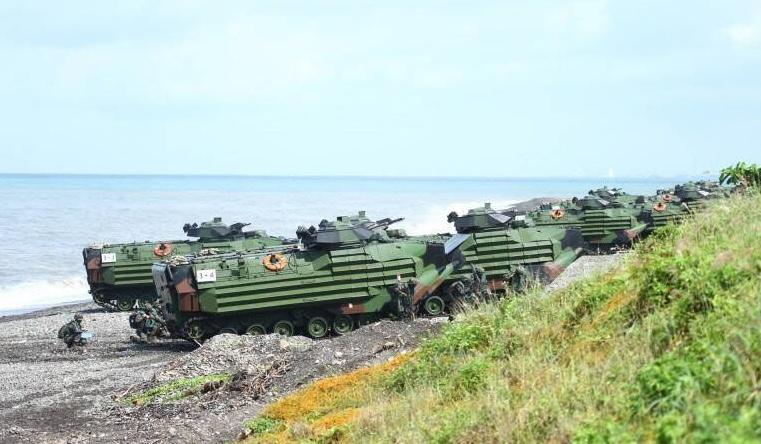The US and Taiwan signed a two-year specialized training program for Taiwan’s navy, the Ministry of National Defense said today, in an unexpected announcement confirming US training.
The US has a history of stationing military instructors and special ops teams in Taiwan to quietly assist with training, but details have been classified.
On Jan. 2, the ministry’s military delegation to the US signed an agreement with the American Institute in Taiwan, an announcement from the ministry showed.

Photo: Chen Yen-ting, Taipei Times
The agreement stated that the US government would send personnel to Taiwan to conduct a two-year specialized naval training program with a budget of NT$49,887,240 (US$1,516,109).
The training program would take place at Kaohsiung’s Zuoying (左營), the headquarters of the navy and marine corps.
The program is likely related to amphibious combat training with the amphibious naval fleet and marine corps.
Although the budget is not high, it is the first time a “specialized training program” with the US has been officially announced, a military source said on condition of anonymity.
The US has changed its low-key and confidential training approach to a semi-public approach, testing political and public reactions, the source said.
The US and Taiwan had previously implemented a training regime in which the US military instructed Taiwan’s amphibious naval fleet and marine corps on joint operations.
However, the project was interrupted when official relations between the US and Taiwan were severed, until 2017 when small-scale exchanges resumed.
In recent years, the marine corps has been sending troops to the US and Guam to receive military training, according to military reports.
The US has also sent senior instructors and small units to Taiwan to provide combat training assistance, but no public confirmations have been made until now.

Taiwan is stepping up plans to create self-sufficient supply chains for combat drones and increase foreign orders from the US to counter China’s numerical superiority, a defense official said on Saturday. Commenting on condition of anonymity, the official said the nation’s armed forces are in agreement with US Admiral Samuel Paparo’s assessment that Taiwan’s military must be prepared to turn the nation’s waters into a “hellscape” for the Chinese People’s Liberation Army (PLA). Paparo, the commander of the US Indo-Pacific Command, reiterated the concept during a Congressional hearing in Washington on Wednesday. He first coined the term in a security conference last

A magnitude 4.3 earthquake struck eastern Taiwan's Hualien County at 8:31am today, according to the Central Weather Administration (CWA). The epicenter of the temblor was located in Hualien County, about 70.3 kilometers south southwest of Hualien County Hall, at a depth of 23.2km, according to the administration. There were no immediate reports of damage resulting from the quake. The earthquake's intensity, which gauges the actual effect of a temblor, was highest in Taitung County, where it measured 3 on Taiwan's 7-tier intensity scale. The quake also measured an intensity of 2 in Hualien and Nantou counties, the CWA said.

The Overseas Community Affairs Council (OCAC) yesterday announced a fundraising campaign to support survivors of the magnitude 7.7 earthquake that struck Myanmar on March 28, with two prayer events scheduled in Taipei and Taichung later this week. “While initial rescue operations have concluded [in Myanmar], many survivors are now facing increasingly difficult living conditions,” OCAC Minister Hsu Chia-ching (徐佳青) told a news conference in Taipei. The fundraising campaign, which runs through May 31, is focused on supporting the reconstruction of damaged overseas compatriot schools, assisting students from Myanmar in Taiwan, and providing essential items, such as drinking water, food and medical supplies,

Prosecutors today declined to say who was questioned regarding alleged forgery on petitions to recall Democratic Progressive Party (DPP) legislators, after Chinese-language media earlier reported that members of the Chinese Nationalist Party (KMT) Youth League were brought in for questioning. The Ministry of Justice Investigation Bureau confirmed that two people had been questioned, but did not disclose any further information about the ongoing investigation. KMT Youth League members Lee Hsiao-liang (李孝亮) and Liu Szu-yin (劉思吟) — who are leading the effort to recall DPP caucus chief executive Rosalia Wu (吳思瑤) and Legislator Wu Pei-yi (吳沛憶) — both posted on Facebook saying: “I